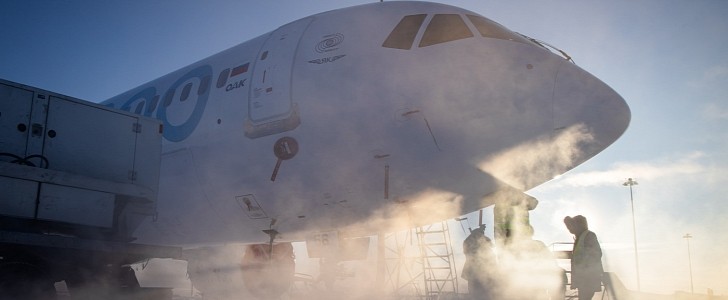Russia started developing a next-generation medium-haul airliner five years ago, and that ambitious project is now closer to obtaining certification. The MC-21-300, boasting innovative composite wings and an advanced engine, has recently completed testing in extreme temperatures in the cold Yakutia.
The MC-21-300 that’s currently being built by the Irkut Corporation was meant to have mostly domestically-developed parts, which would make it more cost-effective and would also make maintenance operations much more convenient. It is not only the first Russian aircraft with composite wings but also one of the few in the world to boast this innovation. The polymer composite materials that were developed together with experts at the Moscow State University are supposed to make the aircraft much lighter compared to others in its size category.
After having completed its first successful flight at the end of last year, the prototype has now undergone challenging tests in very cold temperatures. The Yakutsk Airport is frequently chosen as a testing ground for new aircraft precisely due to the extreme cold. According to the Rostec state corporation, all the aircraft’s systems were tested at temperatures under minus 30 degrees Celsius (-22 degrees Fahrenheit).
The tests have been carried out since the end of January in different areas of the Yakutsk region. Most of the landings were even performed at night when temperatures drop the most. Extreme performance tests included in-flight shutdown, followed by a start-up of one of the engines. Before each stage of the tests, the aircraft had to be completely cooled by remaining outdoors for up to 12 hours. In addition to that, the testing team carried out the usual flight preparation procedures, from fueling to warming up the aircraft.
Although challenging, this extreme weather testing wasn’t the final one for the MC-21-300. According to the manufacturer, the future airliner will also be tested in other Russian regions and abroad in different harsh conditions, such as high temperatures, strong winds, and mountainous terrain. If everything goes well, the next-gen airliner is scheduled to start operating by the end of 2022.
After having completed its first successful flight at the end of last year, the prototype has now undergone challenging tests in very cold temperatures. The Yakutsk Airport is frequently chosen as a testing ground for new aircraft precisely due to the extreme cold. According to the Rostec state corporation, all the aircraft’s systems were tested at temperatures under minus 30 degrees Celsius (-22 degrees Fahrenheit).
The tests have been carried out since the end of January in different areas of the Yakutsk region. Most of the landings were even performed at night when temperatures drop the most. Extreme performance tests included in-flight shutdown, followed by a start-up of one of the engines. Before each stage of the tests, the aircraft had to be completely cooled by remaining outdoors for up to 12 hours. In addition to that, the testing team carried out the usual flight preparation procedures, from fueling to warming up the aircraft.
Although challenging, this extreme weather testing wasn’t the final one for the MC-21-300. According to the manufacturer, the future airliner will also be tested in other Russian regions and abroad in different harsh conditions, such as high temperatures, strong winds, and mountainous terrain. If everything goes well, the next-gen airliner is scheduled to start operating by the end of 2022.






